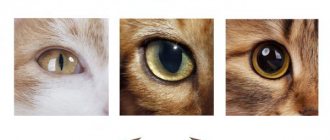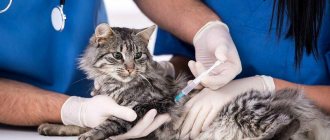Deworming of cats is the use of special drugs to treat and prevent an animal from helminths. Deworming of a pet is required only after examination by a veterinarian and according to a specific scheme, which will protect it from the occurrence of unwanted reactions from the body. Read more about the features of the procedure in our article.
Deworming of cats: features of the procedure
Why is cats dewormed?
This procedure rids your pet of any type of parasite that can cause irreparable harm to the animal. Worms constantly release large amounts of toxic substances into the blood that negatively affect internal systems. The pet begins to suffer from allergic reactions, loses weight and appetite, existing pathologies worsen, and manifestations of previous activity disappear.
The appearance of worms in a cat is accompanied by external manifestations of apathy and indifference to food
Carrying out therapeutic and preventive deworming rids your pet not only of adult helminths, but also of laid larvae and eggs. As a result, all symptoms of intoxication and allergies disappear without the use of other medications, which only remove the symptoms of the disorder without eliminating the underlying cause of the serious condition.
What is deworming and why is it needed?
Deworming is measures aimed at destroying existing parasites or preventing their appearance. Worms are harmful not only to animals, but also to humans. For the safety of the whole family, it is important to prevent their appearance by all means.
For prevention purposes
Preventative treatment is carried out not only for those animals that constantly go outside, but also for couch potatoes. The likelihood of a pet becoming infected is lower, but it still exists. Risk factors include feeding with natural products, namely meat, fish and offal. Such food is often contaminated with parasites. The second source of danger is grass brought from the street.
Before vaccinations and travel
After vaccination, the immune system is weakened, since all its forces are aimed at fighting the introduced virus. A recently vaccinated animal is more vulnerable to helminths. Therefore, before vaccination, it must be dewormed.
Before going abroad, you will have to find out in advance how to properly deworm a cat. The mustachioed traveler will need a veterinary passport and veterinary certificate form No. 1. These documents contain notes on vaccinations and all anti-parasitic treatments. The certificate is issued on the basis of a veterinary passport, clinical examination, fluorescent diagnostics and the results of an analysis for helminths. Its validity period is only 5 days, so all necessary procedures are carried out in advance.
Pre-treatment will also be necessary for those who decide to go to the country. The likelihood of infection in nature is higher, and without additional protection, the pet runs the risk of acquiring parasites.
Deworming is mandatory for mature animals 2-4 weeks before mating. This is necessary to ensure that the expectant mother does not get helminthiasis - it is forbidden to treat a pregnant cat with almost all drugs. In addition, there is always a risk of infection of the offspring.
As a treatment
Infected pets are treated not once, but twice. The first time, anthelmintic drugs kill adult individuals, and the second time, they kill grown-up worms that have hatched from eggs.
Features of eliminating worms in pets
When carrying out the procedure, several important rules are taken into account to achieve the desired effect without harming the cat’s health:
- If there are several individuals in a house or in one area, all should be treated at once.
- Before deworming, it is necessary to check the animal for fleas. If there are any, you need to get rid of them. Fleas carry worm eggs, which can reduce the effectiveness of treatment.
- Pregnant and lactating cats are treated with great care. For them, it is necessary to select traditional methods of treatment. The use of aggressive medications against worms can cause pathologies in the kitten.
- Kittens up to three weeks from birth also cannot be treated and prevented against helminths, since their body is highly sensitive to any chemical.
Infusion of anthelmintic to a cat
Attention! If worm eggs are visible in the animal's feces, it suffers from vomiting, foams at the mouth, and there is bloating, you should select a drug to eliminate worms only with a doctor. Such symptoms indicate acute intoxication of the body and require mandatory therapeutic deworming to prevent death.
Visible and hidden results of treatment
The therapeutic effect is most often achieved with a single use of the drug - this is more than 90% of cases. After treating the kitten, we constantly look into the tray: are there any worms? It is not always possible to see them in the feces; if the kitten has been infected with a small number of helminths, then they are digested in the intestines and are not visible in the tray.
There is a common belief that the more worms found in the feces, the more effective the treatment, but a similar picture is observed precisely when the animal is simply infested with parasites, and repeated treatment is inevitable. If the infection is severe, the helminths may be released through vomiting.
© shutterstock
You can find out for sure about the “expulsion” of worms from a cat’s body only by having its feces analyzed. But visually, in case of successful treatment, there will be a noticeable change in the baby’s appearance, his playfulness will increase, his appetite and stool will improve.
In case of successful treatment, for complete recovery and protection from relapse, you need to take some preventive measures.
Frequency of antihelminthic treatment of pets
An animal should be treated for worms according to a clear schedule, which is usually agreed upon with a veterinarian. To set deadlines, the following criteria must be taken into account:
- pet's age;
- presence of chronic diseases;
- the presence or absence of pregnancy and lactation.
The first dose of anti-helminth medication should be given to kittens already on the 22-23rd day of life. Treatment and prevention are also necessary for a nursing cat; a safe anthelmintic is selected for it or traditional methods are used.
Kittens and cats that have given birth are at risk, since infection can quickly lead to intoxication
After primary therapeutic deworming, medication is repeated once every three months if the pet is constantly in contact with other animals and goes outside. It is enough to treat domestic cats in the spring and autumn, when the risk of contracting parasites is highest.
Transitional seasons are a fertile time for infection with worms
If the animal is undergoing surgery, deworming is carried out unscheduled. Parasites negatively affect blood clotting, which can cause massive bleeding during the procedure.
Attention! Since infection with helminths also occurs in utero, the cat should be well dewormed before mating if more than three months have passed since taking the medication. This is done two weeks before mating.
When and how often to worm a cat
Calculating how to properly deworm a cat is quite easy. To do this, you need to understand the purpose of the event:
- Prevention
. If the pet is kept at home, then it is treated 2 times a year. If access to the street is not limited, then an anthelmintic is given every quarter.
- Treatment
. The anthelmintic is given twice with a break of 10-14 days. Remember that the anthelmintic does not affect eggs.
The schedule can be shifted when traveling abroad or outdoors, undergoing surgery or vaccination, as well as participating in exhibitions. To avoid complications, including overdose, be sure to listen to the advice of your veterinarian and follow the basic rules.
Is it necessary to worm an animal before vaccination?
Deworming before vaccination is a mandatory measure, which is carried out if the last treatment was more than 4-6 months ago. In this case, the administration of anthelmintics is organized according to a special scheme, which provides for a two-time dose of the anthelmintic.
Delayed deworming can lead to serious complications
The first dose of the selected drug affects the activity of adult worms, killing or paralyzing them. After 10-14 days, repeated treatment is carried out, which allows you to destroy the larvae and eggs, as well as the remaining mature parasites. Vaccination after treatment is possible only after two weeks, when the toxin from the antiparasitic agent is completely eliminated.
Lack of results with a two-phase treatment system may indicate an erroneous diagnosis
If you do not deworm the animal before vaccination, it may experience severe damage to the body in the form of kidney dysfunction, massive intoxication, vomiting, diarrhea, and acute allergic reaction. Death is also possible.
Attention! If, even after using the antiparasitic drug twice a day, the cat still has signs of helminths in the body, you should consult a doctor. The veterinarian will recommend another drug and recheck the diagnosis.
Symptoms of helminthic infestation
Every pet owner should know the warning signs that may indicate the presence of helminths. As already mentioned, the disease is asymptomatic for some time, so if your pet’s well-being worsens, urgent measures must be taken
In cats
Several types of helminths pose a danger to cats, some of which are transmitted to humans.
Types of “cat” helminths:
- nematodes or roundworms (ascariasis, hookworm, toxascariasis, toxocariasis, corynosomatosis,
- cestodes or tape (diphyllobothriasis, dipylidiasis, alveococcosis, hydatigerosis);
- trematodes or flukes (opisthorchiasis).
The following symptoms may indicate that a cat is infected with worms:
- weight loss, thinness;
- unhealthy appearance;
- poor wool quality;
- bloated belly “like a drum”;
- vomiting, including helminths;
- constipation;
- diarrhea, bloody or with the presence of helminths or their fragments.
Each of the symptoms requires medical attention. Visit a veterinarian and carry out treatment according to the prescribed regimen. On your own, you can choose the wrong type of medication, give it in insufficient dosage, which will lead to relapse, worsening of the animal’s condition and repeated therapy.
In dogs
Dogs become infected with worms much more often than cats. Even decorative sofa breeds sometimes walk outside and can lick or eat some nasty stuff. But it is simply impossible to protect large and active dogs from this.
A dog's body can be attacked by several types of helminths, each of which is destroyed by a specific drug.
A dog can be a carrier of the following helminthic infestations:
- roundworms and nematodes (toxocariasis, dirofilariasis, toxascariasis, trichinosis);
- tapeworms (echinococcosis, opisthorchiasis, alveococcosis, dipylidiasis; multiceptosis).
Symptoms of helminths in dogs:
- lack of appetite;
- weight loss and deterioration in wool quality;
- mucous membranes are paler than usual or have a yellow tint;
- gastrointestinal upset, constipation, vomiting, diarrhea;
- the presence of helminths or their fragments in the feces;
- cough;
- apathy, fatigue.
If you find one of the symptoms in your pet, immediately visit a veterinary clinic. The doctor will examine the dog, conduct tests and prescribe an adequate treatment regimen.
Consequences of lack of deworming
The presence of worms in an animal’s body poses a real danger to the life and health of cats. Parasites are able to penetrate all internal organs, including the heart, liver, brain and spleen. Parasites quickly grow and multiply, taking all useful minerals and vitamins from the tissues.
Animals infected with parasites quickly become depleted if not properly cared for.
As a result of such exposure without the use of anti-worm medications, the following consequences may develop:
- blockage of channels and passages in organs;
- ruptures of the lining of the intestines and stomach;
- a rapid decrease in the body’s defenses and exacerbation of chronic disorders;
- a drop in hemoglobin levels due to the constant release of toxins by worms;
- the appearance of seizures and lack of appetite;
- impaired respiratory function, most often manifested in the form of shortness of breath;
- weakness and apathy;
- When the brain is damaged, partial or complete paralysis may occur.
The most severe consequence of untreated helminthiasis is paralysis
Attention! Parasites from cats easily enter the human body. Once infected, people experience the same negative symptoms as animals.
Types of helminthiases
Helminthic diseases in cats are caused by different types of helminths, differing from each other in size, shape, methods of reproduction and feeding. Most helminths are dangerous to human health, so it is necessary to clearly familiarize yourself with each type of worm.
Helminthiases are divided into 3 main groups:
- Cestodes (tapeworms). Worms have a flat body, the length of helminths varies from 10 cm to half a meter or more. The body of the worm consists of many segments (segments) in which helminth eggs develop.
- Nematodes (roundworms). The body length is usually from 2 mm, but in some advanced cases of the disease, nematodes can reach a length of up to 10 cm. Helminths live mainly in the small intestine, feeding on the blood of their host. Often, it is with nematodes that the cat suffers from severe anemia.
- Trematodes (flukes). Parasites of this species are much less common than cestodes or nematodes. Penetrating into the animal's body, flukes parasitize the liver or pancreas, leading to severe disorders of organ function.
Tapeworms that live in the body of cats cause diseases such as dipilidia (a helminth reaching a length of about 70 cm, localized in the intestines), diphyllobothriasis (the length of the worm can be more than 1 m, lives in the intestines), alveococcosis (a tape parasite with a length of body about 4 mm, develops in parts of the intestine).
Nematodes lead to diseases such as hookworm (a worm about 2 mm in size, feeds on blood), ascariasis (the length of a worm is from 2 to 5 cm, lives in the liver or intestines of a cat), toxocariasis (a helminth that lives in the intestines).
Trematodes cause diseases such as fascioliasis and opisthorchiasis. Helminths parasitize mainly in the bile ducts of the liver and pancreas. Flukes have a small body size and powerful suckers, thanks to which the parasites attach to the internal organs of the cat.
All helminthiases are dangerous to the health of cats; for example, a disease such as toxocariasis can be transmitted even through mother's milk from cat to kitten. A sick kitten, in the absence of timely treatment, usually does not live long. In addition, there are known cases of toxocariasis infection in humans.
Cestodes pose no less danger to both the cat and its owner. In most cases, tapeworms are not easy to get rid of. The worm has a scolex with hooks, with the help of which it firmly penetrates the intestinal walls of the victim. Often, after the deworming procedure, the parasite dies, and the scolex remains inside the host’s body. After a few weeks, a new parasite body develops from the remaining part. It is necessary to fight cestodes only with powerful anthelmintic drugs.
The dangers of deworming
The procedure is harmful to the animal only if the owner does not follow the instructions and uses the anti-worm drug on pets for which it is prohibited. In this case, the cat may develop truly dangerous health consequences:
- severe vomiting and diarrhea;
- if there are problems with stool before treatment, medications lead to intestinal failure;
- foaming from the mouth and kidney problems;
- rapid drop in body weight;
- bleeding in the digestive tract;
- a sharp drop or rise in blood pressure;
- shortness of breath and difficulty breathing, up to a complete stop;
- congenital malformations in kittens if a pregnant cat has been wormed;
- severe allergic reactions, including anaphylactic shock.
In advanced cases of worm infection, deworming can be fatal.
Attention! In severe cases, when the individual is very weak, after taking an antiparasitic drug, death may occur due to multiple organ failure. In this condition, there is a failure of all body systems with the impossibility of restoring their function even in a clinical setting.
How to give your cat medicine
Inexperienced owners often struggle trying to figure out how to deworm a cat that refuses medication. Not for the first time, spit out tablets gradually dissolve due to saliva, but still do not reach their destination. A frightened animal hides in the farthest corner and prevents any attempts to extract it from there.
This situation can be avoided if you think through everything in advance. The most important thing is to eliminate as much as possible all the exciting moments:
- Do not open medications in the presence of your pet. Measure out the required dose of tablet or suspension before the cat arrives.
- Wait for the right moment. It is easier to act in a state of rest or strong fascination with another object. Try gently waking your sleeping pet or giving him a pill when he persistently asks for food.
If you can’t do everything quickly, secure the cat on your lap with a blanket or towel, leaving only the head free. Gently open your jaws and place the tablet on the root of your tongue. After this, close your mouth and stroke your pet’s neck, provoking the swallowing reflex.
For the most aggressive and persistent, it is recommended to make a decoy by wrapping the tablet in a tasty piece of minced meat or cottage cheese. The medicine can also be crushed, mixed with water and served as a suspension.
A suspension or paste is more readily accepted by many animals, but there can be problems here too. If you are not yet comfortable with the deworming procedure, carry it out with the help of a second person. Later, you will learn how to quickly and deftly give your cat medicine.
Antihelminthics for cats
There are a large number of medicines that are used for therapeutic and preventive deworming. They differ from each other in the active substance and its dosage. Contraindications usually include pregnancy and lactation, the presence of severe kidney and liver disorders, and the pet’s age up to three weeks.
In the developing fragile organisms of kittens, pathological changes can occur with inadequate drug therapy
Table 1. Antihelminthic drugs and their effect
| Name | Release form | Dose | Action | Admission course |
"Azinox" | Pills | Selected at the rate of 1 ml/kg | A broad-spectrum anthelmintic, used against sexually mature individuals and their eggs. Causes paralysis of harmful organisms and their removal naturally | The medication is given once in the morning |
"Bars Spot-On" | Drops for withers | Cats up to two kilograms require 0.2 ml of solution. From 2 to 5 kg, 1 ml of concentrate is used. If the cat weighs more than 5 kg, 2 ml of the active substance must be prescribed | A broad-spectrum antiparasitic agent, available in the form of drops for use on the pet’s withers. The drug contains praziquantel and ivermectin. At the same time eliminates infestation by fleas, lice-eaters, ticks | Can be used once |
"Dironet" | Tablets and suspension | Cats are administered Dironet at a dose of 1 ml/kg. The suspension is prescribed in the same quantity | Refers to a broad spectrum of anthelmintics used for the prevention and treatment of individuals. Ingestion of the active substance "Dironet" leads to paralysis of adult parasites, eggs and larvae. They are then excreted naturally | Treatment and prevention are carried out once |
"Dirofen" | Pills | Kittens take Dirofen at the rate of one tablet per kilogram of weight. Adults take treatment at the rate of one tablet for every five kilograms of weight | It has a paralyzing effect on adults; fenbendazole eliminates the activity of larvae and kills parasite eggs. The composition of the drug includes pyrantel and fenbendazole, which are considered as safe as possible, provided that the dose is selected correctly. | The appointment is one-time only. It is recommended to take the medicine in the morning |
"Drontal for cats" | Tablets, suspension | 1 tablet of medication per 4 kg of body | Effective against most parasites. The tablets contain pyrantel embonate and praziquantel. The first substance has an effect on adult parasites, praziquantel enhances its effectiveness and eliminates immature individuals and larvae | Apply once in the morning |
"Kaniquantel plus" | Pills | 1 tablet per 10 kg of body. For cats it is usually recommended to reduce the amount of active substance by half | It is most often used for mixed helminth infections. The composition contains two active substances – praziquantel and fenbendazole. Both components are active against sexually mature parasites, larvae and eggs | The solution must be taken in the morning along with food immediately and once |
"Panacur granulate" | Pills | Kittens are prescribed the medication at 225 mg/kg, adults receive a dose of 450 mg/kg | Suitable for treating weakened individuals and small kittens. The active substance fenbendazole has a toxic effect on parasites, causing their exhaustion and death. Allows you to get rid of parasites located in the lungs and intestines | Taken once in the morning with the first meal or before it |
| "Piradek" | Suspension | 1 ml/kg body. If the cat weighs less than 500 grams, another 3 ml of warm boiled water must be added to the measured dose of the active substance | The suspension contains pyrantel pamoate, the main effect is on adults and larvae. You may need to take a stronger medication to eliminate the eggs. Pyrantel pamoate has a paralyzing effect, after which the parasites are eliminated from the digestive tract naturally | Apply once in the morning |
"Poliverkan" | Sugar cubes | Cats up to five kilograms need to take 0.5 cubes. If the animal weighs from 5 to 10 kg, the dose of medication is 1 cube | Broad-spectrum anthelmintic. "Polyvercan" has a direct effect on all parasites, depleting them, which ultimately leads to the death of the pest | The prophylactic dose is one-time; it is better to give the medication in the morning with the main meal. During therapeutic deworming, the medication should be given again after 10 days. |
"Prasicide" | Tablets, suspension | 1 tablet per 3 kg of weight. If the cat weighs less than this weight, the tablet should be crushed | A specially developed medication against tapeworms and roundworms in cats. Prazicide contains pyrantel and praziquantel. Has a paralyzing and debilitating effect, which ultimately leads to the death of the parasite | Apply once in the morning |
"Profender" | Drops on the withers | If the animal weighs from 500 g to 2.5 kg - 0.35 ml; with a cat weighing from 2.5 to 5 kg – 0.7 ml; with body weight from 5 to 8 kg – 1.12 ml; if the cat weighs over 8 kg, you need to select a combination of pipettes at the rate of 0.14 ml/kg | An anthelmintic agent with complex effects. The medication contains emodepside and praziquantel. | Treatment is one-time only |
Attention! If there is a high probability of infection or therapeutic deworming is carried out, after 14 days you can repeat taking the medicine against worms. Repeated treatment is always carried out if the pet has been diagnosed with ascariasis. Additional information about roundworm in cats can be found on our portal.
If you are having difficulty getting your pet to take pills, here are some helpful tips to make it easier for your cat to take medication.
Getting your cat used to taking pills
Contraindications to deworming in kittens
Despite the large selection of modern anthelmintic drugs for kittens, deworming for preventive and therapeutic purposes is not recommended for self-prescription in the following cases:
- chronic viral or bacterial infections;
- general weakening of the body after surgery or serious illness;
- severe exhaustion of the body;
- serious disorders associated with liver and kidney disease;
- previously identified intolerance to anthelmintic drugs;
- significant helminth infestation.
In these cases, deworming is carried out only under the strict supervision of a doctor or is postponed until the condition stabilizes.
In any case, consultation with a specialist and selection of an individual treatment scheme is highly desirable.
Deworming with folk remedies
They are considered less dangerous for cats and are suitable even for pregnant cats. Despite the absence of aggressive substances in the composition of non-traditional anthelmintic drugs, it is better to coordinate their use with a veterinarian.
Table 2. Traditional methods against worms in cats
| Ingredients | Cooking method | Dosage | Admission course |
Chamomile or fennel | Grind a teaspoon of any raw material, pour 200 ml of boiling water over the herb, leave for 20 minutes and strain | Give instead of water in a drinking bowl, pour 5-10 ml of solution into the mouth up to five times a day | Every day for a week |
Bulb | Take a medium onion and cut it into 4 parts, pour 200 ml of boiling water over the component, let stand for 20 minutes and strain | In the morning on an empty stomach, 10-20 ml | Every day for a week |
Tansy | Grind a tablespoon of raw material and pour 250 ml of boiling water. leave for an hour, cool and strain | Give 10-20 ml an hour before meals three times a day | Every day for a week |
Alcohol infusion of wormwood | Purchased at a pharmacy | 5-10 drops in the morning and evening an hour before meals | During one week |
Carrot | Strain freshly squeezed carrot juice without pulp, using a soft enema, pour it into the animal’s anus | 10-20 ml of juice depending on the size of the cat | Once a day for a week |
Garlic | Chop a small clove of garlic and mix it into the cat food | No more than one slice per day | During one week |
Attention! Folk remedies against worms for cats are relatively safe. They do not cause intoxication, but can provoke allergic reactions.
Drugs that take into account the baby’s age
What to give a kitten for worms? Veterinary pharmacies are ready to provide a large selection of anthelmintic drugs for kittens, but you should not rely on the experience of a cat pharmacist when choosing the right drug, even if he is an experienced veterinary pharmacy employee. We rely on the doctor's recommendations. When buying a product, pay attention to the shelf life, never buy the medicine in random places , but only in certified pharmacies, otherwise, at best, it will be useless, and at worst, it will harm the kitten.
Let's look at deworming medications prescribed to kittens as they grow older:
- Two weeks: Dirofen;
- Three weeks for a kitten: Kanikquantel, Prazicide in suspension, Trontsil K, Drontal in tablets;
- Five weeks: Profenler drops;
- Six weeks: Milbemax;
- Month: Polyvercan-sugar cubes;
- Three months: drops on the withers Inspector, tablets: Pratel, Polyvercan, Fetabl.
Remember: medications for a kitten are selected by a veterinarian individually, taking into account the age, breed and other characteristics of the baby. New generation drugs have significant advantages, rarely cause allergies, and have few side effects.











